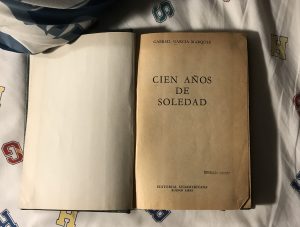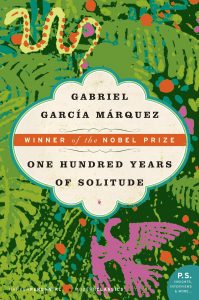 “Muchos años después, frente al pelotón de fusilamiento, el coronel Aureliano Buendía había de recordar aquella tarde remota en que su padre lo llevó a conocer el hielo. [Many years later, as he faced the firing squad, Colonel Aureliano Buendía was to remember that distant afternoon when his father took him to discover ice.]” So begins the multigenerational saga One Hundred Years of Solitude, which earned Colombian novelist Gabriel Garcia Márquez a Nobel Prize for Literature. It’s an intoxicating, immersive read — perfect for a stretch of time alone (if not quite a century!).
“Muchos años después, frente al pelotón de fusilamiento, el coronel Aureliano Buendía había de recordar aquella tarde remota en que su padre lo llevó a conocer el hielo. [Many years later, as he faced the firing squad, Colonel Aureliano Buendía was to remember that distant afternoon when his father took him to discover ice.]” So begins the multigenerational saga One Hundred Years of Solitude, which earned Colombian novelist Gabriel Garcia Márquez a Nobel Prize for Literature. It’s an intoxicating, immersive read — perfect for a stretch of time alone (if not quite a century!).
Colonel Aureliano Buendía and his father, José Arcadio, are the first members we meet of the Buendías, the founding family of the almost-isolated South American town of Macondo. More generations follow, all the way down to José Arcadio’s great-great-great-great-great grandson, also named Aureliano. The story is vastly bigger than any individual life; we follow the exploits of each successive generation of Buendías, and then watch the next generation come up to take their place. The novel goes on as individual plots and characters begin and end, like the cells replacing themselves in a human body; and yet there are constant echoes from one generation to the next, passing down not only certain names (José Arcadio, Aureliano, Remedios) but also personality types — adventurers, mystics, hotheads, lovers, loners. In a memorable passage, the Buendía family is compared to a wheel, slowly wearing down as it turns again and again. Both the novelty and the repetition of each new turn offers delight, twinned with the melancholy knowledge that it can’t go on forever.
One Hundred Years of solitude is often cited as a prime example of “magical realism,” a term for the matter-of-fact way that Márquez and his South American contemporaries like Jorge Luis Borges and Isabel Allende introduce otherworldly aspects of their narratives. That phrase has become a bit notorious among literary critics for its overuse; perhaps it’s more accurate to describe One Hundred Years of Solitude as dreamlike. Not only do dreams treat impossible things as simply part of how the world works, dreams also manage to be at once intensely vivid and strangely indistinct in the mind’s eye. As you’re reading, everything feels fresh in your mind; try to summarize the whole novel, though, and it slips through your grasp as generations of Aurelianos and José Arcadios blend together — much as the details of a dream are intense at the time and difficult to recall after waking, except for the way that it made you feel.
 Like immersive novels, dreams are hard to recount once we emerge from their spell because the vivid experience they offer is so radically different from waking life that it starts to melt away on contact. But both dreams and novels are also ways of working through the materials of real life. One Hundred Years of Solitude, for all its fantastical qualities, is also steeped in history: while Macondo is remote, it is not quite isolated, and the novel reflects the history of Colombia and the region through a funhouse mirror. There are rebellions and civil wars, foreign influences and exploitative industries — one of the climactic moments, a massacre of striking banana workers, is based on a real 1928 massacre perpetrated by the Colombian army at the request of the United Fruit Company and the U.S. government. The occasional eruption of real-world history, even catastrophe, in this otherworldly novel makes it a well-suited read for quarantine: this strange, trancelike time of isolation in which we are nonetheless acutely aware of historic events going on all around us.
Like immersive novels, dreams are hard to recount once we emerge from their spell because the vivid experience they offer is so radically different from waking life that it starts to melt away on contact. But both dreams and novels are also ways of working through the materials of real life. One Hundred Years of Solitude, for all its fantastical qualities, is also steeped in history: while Macondo is remote, it is not quite isolated, and the novel reflects the history of Colombia and the region through a funhouse mirror. There are rebellions and civil wars, foreign influences and exploitative industries — one of the climactic moments, a massacre of striking banana workers, is based on a real 1928 massacre perpetrated by the Colombian army at the request of the United Fruit Company and the U.S. government. The occasional eruption of real-world history, even catastrophe, in this otherworldly novel makes it a well-suited read for quarantine: this strange, trancelike time of isolation in which we are nonetheless acutely aware of historic events going on all around us.
An ebook of the standard English translation is available from the Internet Archive.. Readers fluent in Spanish should consider experiencing Márquez’s extraordinary style directly; a Spanish ebook is available here for those with access to Overdrive through a public library. Audiobook is free from Amazon with Audible trial.
Read more on Gabriel García Márquez in Spanish from Rutgers PhD, now SUNY Oneonta professor and renowned Columbian author, Gustavo Arango, including his many personal encounters.